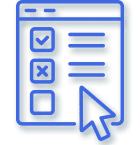What does an Addiction Counselor in Virginia do? What is Their Job Role?
When you graduate with your bachelor’s or master’s degree in substance abuse mental health and counseling, you’ll be required to study for, and take a state-approved exam to be licensed as a Licensed Substance Abuse Treatment Practitioner (LSATP).
To enter this substance abuse counseling, you’ll have to complete your university education and receive your degree—this is mandatory for anyone who plans to work in a substance abuse field or treatment facility.
Compare Popular Online Substance Abuse Counseling Programs
Overview
Every certified substance abuse counselor in Virginia is required to be licensed. If you are a recent graduate, evidence of completing university requirements with an official transcript suffices until you take your licensure exam.
Every certified substance abuse counselor in Virginia is required to receive a specific number of clinical supervision hours. A clinical practitioner in your office or a nearby office will provide your supervision, which you are required to document for your license.
Every certified substance abuse counselor in Virginia is required to receive a specific number of clinical supervision hours. A clinical practitioner in your office or a nearby office will provide your supervision, which you are required to document for your license.
Virginia Licensing & Certifications for Associates & Independent Counselors

While the term, “certified substance abuse counselor CSAC” was used in the Overview, Virginia counselors are identified by several different terms. These include the Certified Substance Abuse Counselor CSAC, Substance Abuse Counselor Assistant (CSAC-A) and the Licensed Substance Abuse Treatment Practitioner (LSATP).
Each category has to meet different educational, licensing and renewal requirements. If you have a bachelor’s degree, you’ll be required to complete a certain number of practice hours and clinical supervision hours. Certified substance abuse counselors with master’s degrees will have different requirements than do those with bachelor’s degrees.
If you move to Virginia from another state, and you practiced as a certified substance abuse counselor in that other state, you’ll have to pass the NCCAP Master Addiction Counselor (MAC) before you apply for licensure as a LSATP here. If you are a Virginia substance abuse counselor who already holds an unrestricted Licensed Professional Counselor (LPC) license from Virginia, you are waived from taking this exam.
Request your official Virginia substance abuse counseling transcript from your university. If you already have a Virginia license as a LPC or Licensed Marriage and Family Therapist (LMFT), you don’t have to do this.
Be ready to provide proof of having at least 24 of the past 60 months of post-licensure clinical practice. This must be in a direct clinical substance abuse treatment capacity. You may also have evidence of clinical supervision of these services—you will have to provide documentation of supervised experience which meets the requirements of the state in which you were first licensed. A certified copy of your original application provides this proof. Again, if you hold a Virginia license for LPC, LMFT, Licensed Clinical Social Worker (LCSW) or Licensed Clinical Psychologist (LCP), you won’t have to provide this documentation.
Education Requirements
Virginia certified substance abuse counselors who hold bachelor’s degrees are required to complete 400 clock hours of substance abuse mental health education from an accredited college or university. If you didn’t go to college, then you should have attended workshops or seminars meeting requirements in subsection B:
- 220 hours of didactic training in Virginia substance abuse counseling. You should have at least 10 clock hours in:
- Understanding dynamics of human behavior;
- Treatment approaches;
- Signs and symptoms of substance abuse;
- Continuum of care and case management skills;
- Recovery process and relapse prevention methods;
- Ethics
- Professional identity in providing substance abuse services;
- Crisis intervention
Accumulate at least 20 hours in:
- Substance abuse counseling, treatment planning and substance abuse research;
- Group counseling
Also required:
- Orientation of new clients to a program’s rules, procedures, goals, services, costs and rights of the client;
- Screening clients in determining eligibility and fit for a particular program;
- Intake of clients, performing administrative and first assessment tasks needed for admission to a program;
- Assessment of client strengths, need, problems and weaknesses so development of a treatment plan can begin;
- Treatment planning with client to identify and number-rank the problems to be treated, develop goals and come to agreement on treatment processes;
- Counseling client by using specialized skills in individual and group approaches to meet established treatment goals;
- Case management activities (looping in other services, people, agencies and resources in a wrap-around treatment plan to meet goals);
- Crisis intervention responses to address acute emotional, mental and physical distress;
- Educating clients by giving information about drug abuse and the services and resources available;
- Referral of clients in order to meet their identified needs by certified substance abuse counselor and aiding client in making use of appropriate resources;
- Reporting and charting client information from assessment and through treatment, progress and discharge summaries, along with client-related data;
- Consulting with other professionals to ensure high quality, comprehensive care for each client.
Each task must be performed for at least eight hours under a supervisor. These should be verified as one part of substance abuse counselor’s application by their supervisor.
CACREP Accredited Online Certification

Two types of substance abuse counseling accreditations are recognized in the United States; institutional substance abuse counseling and specialized substance abuse counseling. Institutional accreditation takes the entire institution into account while the specialized focus on professional preparation programs. The Council for Accreditation of Counseling and Related Educational Programs (CACREP) is a specialized accreditation that focuses on master’s and doctoral degree programs in counseling at colleges and universities worldwide. Only already-accredited institutions are eligible for CACREP review. The review for accreditation will center on programs offering graduate degrees in counseling.
Find Your Online Addiction Counseling Program
Choosing a CACREP-accredited program ensures that the program meets the highest of quality standards. Many counseling specialties are accredited bythe CACREP, including addiction counseling. Accredited addiction counseling programs prepare individuals to work with those affected by addictive behavior and their families. Addictive behaviors include alcohol, drugs, food, gambling, sex, and anything else that negatively affects your personal or work life by creating addiction behaviors.
CACREP-accredited programs will focus on treatment models and the phases of addiction including prevention, recovery, and relapse prevention. These 60-semester hour programs will include the application of interventions. When students choose a CACREP-accredited program they can be confident that:
- the program meets or exceeds national standards
- the program will focus on professional counseling rather than psychology oreducation
- the program has an excellent reputation
- CACREP graduates statistically receive higher scores on the National Counselor Examination for Licensure and Certification (NCE).
- the requirements for licensure will be met.
Board of Counseling
The Virginia Board of Counseling exists to regulate the mental health industry as well as to stay abreast of community and professional needs. The Board inspects mental health professionals to ensure that licensees practice in conformance within state regulations. The Board of Counseling also enacts and enforces qualifications for licensure and regulations for the practice of Marriage and Family Therapists as well as Substance Abuse Treatment Practitioners. They operate according to regulations established by the Virginia Board of Behavioral Health and Developmental Services.
Address
Perimeter Center
9960 Mayland Drive
Suite 300
Henrico Virginia 23233-1463
Phone
(804) 367-4610
Website Address
https://www.dhp.virginia.gov/counseling/
Licensure:
- Licensed Professional Counselor (LPC)
Counselor Testing & Examination Process

Virginia’s Board of Counseling Regulations Governing the Practice of Licensed Substance Abuse Treatment Practitioners underwent a change which became effective on Aug. 24, 2016. Applicants now must take and pass the approved national exam within two years of Board approval. LSATPs who were previously approved and licensed before this change took place must now pass a subsequent exam on or before August 24, 2018, in order to retain licensure.
Exams are given on demand, with testing sites available in major cities throughout the United States.
Certified Substance Abuse Counselors are required to pass the NCAC-1 exam to obtain their CSAC certification, The National Certification Commission for Addiction Professionals (NCC AP) provides the exam, along with the Association for Addiction Professionals (NAADAC). This exam is also given on demand, in large cities throughout the U.S.
Certified Substance Abuse Counselor Assistants (CSAC-A) are supposed to take the Virginia State Constructed substance abuse counselor assistant exam. After being approved to take this exam, it will be mailed to you. It’s an open-book test. You should refer to the Regulations Governing the Certification of Substance Abuse Counselors and Substance Abuse Counseling Assistants as you take your exam. When you finish the test, return it by fax, mail or email to the Board of Counselors for processing.
Clinical Supervision Explained
All Licensed Substance Abuse Treatment Practitioners, Certified Substance Abuse Counselors and Certified Substance Abuse Counseling Assistants are required to undergo regular clinical supervision. It’s a part of the requirements for renewal of the counselor’s license to practice.
Specifically, an applicant for initial licensing should be able to document 2,000 hours of supervised experience in providing clinical substance abuse counseling services.
This supervised experience should consist of at least one hour and a maximum of four hours weekly of supervised activity between the clinical supervisor and their applicant. This should total 100 hours that can be documented within required professional experience. Up to one-half of supervision hours can consist of group work. One hour of supervised group work will be the equivalent of one hour of supervision during individual counseling or client work.
The Virginia Board of Counseling requires all applicants to document their successful completion of clinical supervision, noting this on the Verification of Supervision Form when they are filling out their form.
Renewal and Continuing Education

The requirements of the Virginia Board of Counseling are straightforward. It has no pre-approval process for continuing education requirements. Instead, Virginia substance abuse counselors are directed to go to the “continuing competency activity criteria” to answer any questions regarding CE courses they are considering taking. LSATPs should go to Section 18 VAC 115-60-116.
Every certified Virginia substance abuse counselor should have obtained all required continuing education hours before June 30th. Every certified Virginia substance abuse counselor will be required to verify that they have met the continuing competency requirements.
The window for beginning to receive continuing education hours begins on July 1 of every calendar year. They must complete their CE hours by June 30th of that licensure year. The hours they have received for the current licensure year are applied to that calendar year. If the certified substance abuse counselor has any additional hours beyond the minimum requirement, they cannot carry those hours forward to an upcoming renewal year.
Every certified substance abuse counselor is required to take a CE course in ethics every year. They should document at least two hours of course participation in CE courses that focusing on ethics and standards of practice. CE courses that cover laws governing behavioral professionals should also be taken.
Those certified substance abuse counselors who have just obtained their initial licensure are exempt from taking the full 20 hours of CE courses. This includes LPCs, LSATPs and LMFTs. This applies only for the first renewal period after obtaining the first license to practice. Those LMFTs, LPCs and LSATPs who were licensed by endorsement must take the full 20 continuing education hours in the first calendar year after obtaining their first licenses.
CSACs, substance abuse counselor assistant, and CRPs don’t have to document continuing education hours toward the renewal of their license renewals. All they have to do is take the courses and send their paperwork minus the documentation of continuing education.
Potential Counselor Career Path Options
- Addiction Counselor
- Alcohol and Drug Addiction Counselor
- Behavioral Health Specialist
- Certified Addiction Drug and Alcohol Counselor
- Chemical Dependency Counselor
- Mental Health Counselor
- School Counselor
- Substance Abuse Counselor
Associations & Organizations

In Virginia, substance abuse counselors (CSAC, CSAC-A, CRP, LPC, LMFT and LSATP) can turn to the Virginia Association of Addiction Professionals, or VAAP. This association used to be called the Virginia Alcoholism and Drug Abuse Counselors.
VAAP works to advance the practice of alcoholism and drug counseling by emphasizing its professional Code of Ethics of the association. It is working to adopt a high level of competency, which helps to ensure that clients receive only the highest quality of care and counseling, so they can address their addictions and issues related to their use of substances or alcohol.
By emphasizing ethics and a high level of counseling competency, every substance abuse counselor in Virginia becomes a part of the solution that addresses and combats substance abuse.
